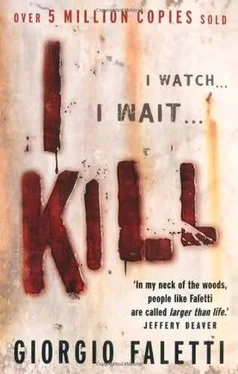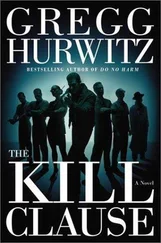‘That’s a start. More than I know. Once we’re in, how do we get the guy out of there, if he’s inside?’ As he spoke, Frank mentally crossed his fingers in hope.
Roberts lit another cigarette and took a long draw. ‘He’s got to be able to breathe down there, right? If we find the air holes, we can get him out with tear gas.’
‘I don’t think that’s feasible.’ Gavin shook his head. ‘We can try, but if things are the way Frank said and the guy has done the maintenance, it won’t work. If he’s kept up with the latest technology, forget it. Modern bomb shelters have an air-purification system that uses filters with normal or activated carbon acting as absorbers. Activated carbons are used as filtering agents in gas masks and high-risk ventilation systems, like in nuclear power plants. They’re used in tanks and military planes too. They can resist hydrocyanic acid, chloropicrin, arsine and phosphine. So tear gas wouldn’t do anything.’
Frank looked at Lieutenant Gavin with greater respect. If this was something he knew only a little about, what would he say if he was an expert? Frank raised his arms. ‘Okay, we’re here to solve a problem. Sometimes you solve problems by making stupid suggestions. Here’s mine. Lieutenant, what’s the chance that we could open the door with explosives?’
‘Well… it’s possible,’ Gavin said, shrugging with the apologetic expression of someone forced to keep giving bad news. ‘I’m not an expert, mind you, but logically a shelter like that is built to resist an atomic bomb. You’d need to make a lot of noise to get it open. But, and here’s the good news, keep in mind that this shelter is more than thirty years old so it’s not as efficient as the ones they build now. If there’s no alternative, that might be the best idea.’
‘If we opt for explosives, how long would it take?’ This time, the lieutenant’s scowl led to a positive conclusion.
‘Not long. We’ve got an explosives expert, Brigadier Gachot. If he and his team get to work immediately, all we need is the time it takes to get some C4 or something like that over here.’
‘Call the unit and get Gachot on it. Explain the situation and tell him where we are. I want him here in fifteen minutes max.’
The commando raced off without so much as the ‘Yes, Sir’ that Frank would have expected from him. Frank looked at each of the men standing before him.
‘Any other ideas?’ He waited for an answer that didn’t come and then decided to take the bull by the horns. ‘Okay, here’s how it’s going to be. If our man is in there, he can’t escape. Once we locate him, we can hypothesize all we want. First, let’s find this damn shelter and then we’ll decide what to do. From here on in, we improvise. Let’s move.’
The shift from conjecture to action put the crisis unit on much more familiar ground. They removed the seals from the gates and rushed down the ramp leading to the garage. Within seconds they had occupied the house, using a plan that was part of their training. They were silent, fast and potentially lethal.
At first, Frank had considered their presence there a ridiculous and excessive precaution. But after ten deaths, he was forced to realize that they were an absolute necessity.
The soldier who had described the entrance to the bunker led the way through the courtyard. He raised the door and went into the empty garage. There was a mountain bike hanging on a rack on the right wall and in the corner, a ski rack for the roof of Jean-Loup’s car. Next to it was a pair of carving skis, their rackets tied together with bungee cords. There were no snide remarks about the owner’s interest in sports. They also knew that there was a well-equipped gym upstairs. In light of what had happened, they realized that all that physical activity had not just been for fun.
At the back of the garage, they went down a corridor that turned to the right. A door in front of them opened on to a small bathroom. They walked single file, led by a commando aiming an M-16 rifle ahead of him. Frank, Gavin and Morelli took out their pistols. Roberts was at the end of the line, moving with an easy stride, soft as a cat. He felt no need to take out his gun. He simply unbuttoned his jacket so that it would be ready if needed.
They reached the laundry room, probably the cleaning lady’s area. There was a washing machine, dryer, ironing board and iron. To the left, a huge white cupboard took up the entire wall. In the corner next to the doorway, a stairway led down from upstairs. Another commando was coming down just at that moment.
There was a wooden bookshelf against the wall opposite the doorway. ‘That must be it,’ whispered the agent, pointing with his rifle.
Frank nodded in silence and put away his gun. He went over to the bookcase and examined it from the right while Morelli did the same on the left. Gavin and his two men stood in front of them, their weapons aimed as if danger could emerge from behind it at any second. Even Roberts pulled out his Beretta, which looked huge and menacing in his thin hands.
Frank grabbed hold of one of the shelves and tried to push it to one side. Nothing happened. He ran his hands along the wood on the side and found nothing. He raised his head and looked at the top of the shelves a couple of feet above him. He glanced around and then pulled over a metal chair with a Formica seat. He climbed on to it to see the upper shelf. He immediately noticed that there wasn’t a speck of dust. Then, in the corner by the wall, in a groove in the wood, he could see a tiny metal lever that seemed to come from a hinge. The mechanism was well oiled and there was no trace of rust. It seemed to be in perfect working order.
‘Found it,’ said Frank. Morelli turned and saw him carefully examining something on the top shelf that he couldn’t see. ‘Claude, do you see any hinges from where you are?’
‘No, if there are any, they’re concealed inside.’
Frank looked down on the ground. There were no marks on the stone tiles. The door probably opened forwards. If it went sideways and the shelves moved, he would be knocked off the chair. He thought of Nicolas Hulot and all of No One’s other victims and decided that it was a small risk compared with what they had suffered. He turned to the men standing in front of the bookcase with their guns pointed.
‘Keep your eyes open. Here I go.’
The three men got into position, their legs spread apart and slightly bent, holding their guns with both hands pointed at the bookcase. Frank pushed the lever all the way. They heard a sharp click and the bookcase opened outward like a door, silently rotating on well-oiled hinges.
A heavy metal door, mounted in bare cement, appeared before their eyes. There were no visible hinges. The closure was so perfect that the separation between the door and the frame was almost undetectable. There was a wheel on the left to open the door, similar to those in submarine hatches. They stood in silence, spellbound by that dark metal wall. Each man tried in his own way to imagine what or who was behind it.
Frank stepped off the chair and went to the door. He tried grabbing and pulling the wheel, which was also a handle, and met with the resistance he expected. Turning the wheel in one direction and the other, he realized it was pointless to keep trying.
‘Doesn’t budge. It must be locked from the inside.’
As they all finally lowered their weapons and came up to the door, Frank mused over their absurd situation and now visualized not one but two hands with fingers crossed. He stared at the metal as if trying to melt it with his eyes.
You’re in there, aren’t you? I know you are. You’re in there with your eyes glued to this armoured door wondering how we’ll get you out. What’s ridiculous is that we’re wondering the exact same thing. And the most ridiculous part is that we’ll have to do backward somersaults, and maybe some of us will lose our lives in order to drag you out of this prison and put you in another one just as impregnable.
Читать дальше










